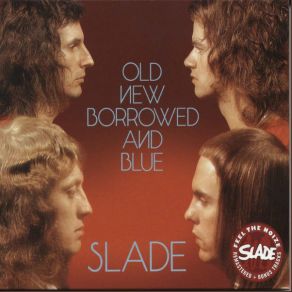Old New Borrowed and Blue
Download links and information about Old New Borrowed and Blue by Slade. This album was released in 1974 and it belongs to Rock, Glam Rock, Hard Rock, Heavy Metal genres. It contains 17 tracks with total duration of 57:34 minutes.

|
|
|---|---|
| Artist: | Slade |
| Release date: | 1974 |
| Genre: | Rock, Glam Rock, Hard Rock, Heavy Metal |
| Tracks: | 17 |
| Duration: | 57:34 |
| Buy it NOW at: | |
| Buy on iTunes $9.99 | |
| Buy on Amazon $8.99 | |
Tracks
[Edit]| No. | Title | Length |
|---|---|---|
| 1. | Just a Little Bit | 4:01 |
| 2. | When the Lights Are Out | 3:06 |
| 3. | My Town | 3:07 |
| 4. | Find Yourself a Rainbow | 2:11 |
| 5. | Miles Out to Sea | 3:50 |
| 6. | We’re Really Gonna Raise the Roof | 3:10 |
| 7. | Do We Still Do It | 3:02 |
| 8. | How Can It Be | 3:02 |
| 9. | Don’t Blame Me | 2:33 |
| 10. | My Friend Stan | 2:41 |
| 11. | Everyday | 3:11 |
| 12. | Good Time Gals | 3:34 |
| 13. | I’m Mee I’m Now and That’s Orl | 3:41 |
| 14. | Kill 'Em At the Hot Club Tonite | 3:20 |
| 15. | The Bangin’ Man | 4:12 |
| 16. | She Did It to Me | 3:19 |
| 17. | Slade Talk to "19" Readers | 5:34 |
Details
[Edit]It took Slade two years and one hits-and-rarities compilation (Sladest) to get around to following up 1972's U.K. chart-topping Slayed?, two years during which the entire complexion of the band had altered dramatically. No longer the rampant yobs out on the stomp of yore, the quartet members placed the rabble-rousing bombast of old far behind them during 1974, and switched their songwriting efforts to more mellow pastures — the gentle "Everyday," the yearning "Far Far Away," and the decidedly pretty "Miles Out to Sea." Old New Borrowed and Blue was the album that introduced the chrysalis to its audience — not that you'd know it from the opening bellow. Riding a raw guitar line based, very loosely, around the guttural riffing of the Beatles' "Birthday," "Just a Little Bit" cranks in with almost metallic dynamics, even retaining the in-concert ad-libbing that had long since made it a highlight of the live show. "We're Gonna Raise the Roof," "When the Lights Are Out," and "My Town," too, offer little that Slade wasn't already well renowned for and that, perhaps, was what the bandmembers were thinking as well. The glitter-soaked thunderclap was old news now; they could write those rockers in their sleep. The vaudeville piano-led "Find Yourself a Rainbow," though, was new territory altogether, while the country-rock-inflected "How Can It Be" posited a direction that Holder himself admitted had long been a regular on his home turntable. It was "Everyday," however, that held the secret of the band's future, a crowd-swaying singalong of such scarf-waving majesty that it might well be single-handedly responsible for every great record U2 has ever made. It was certainly Slade's most memorable new single in a while and, as the cue for further airborne anthems, it became one of the most crucial songs in the group's entire repertoire. On an album that, at best, can be described as patchy, "Everyday" is a new day altogether.